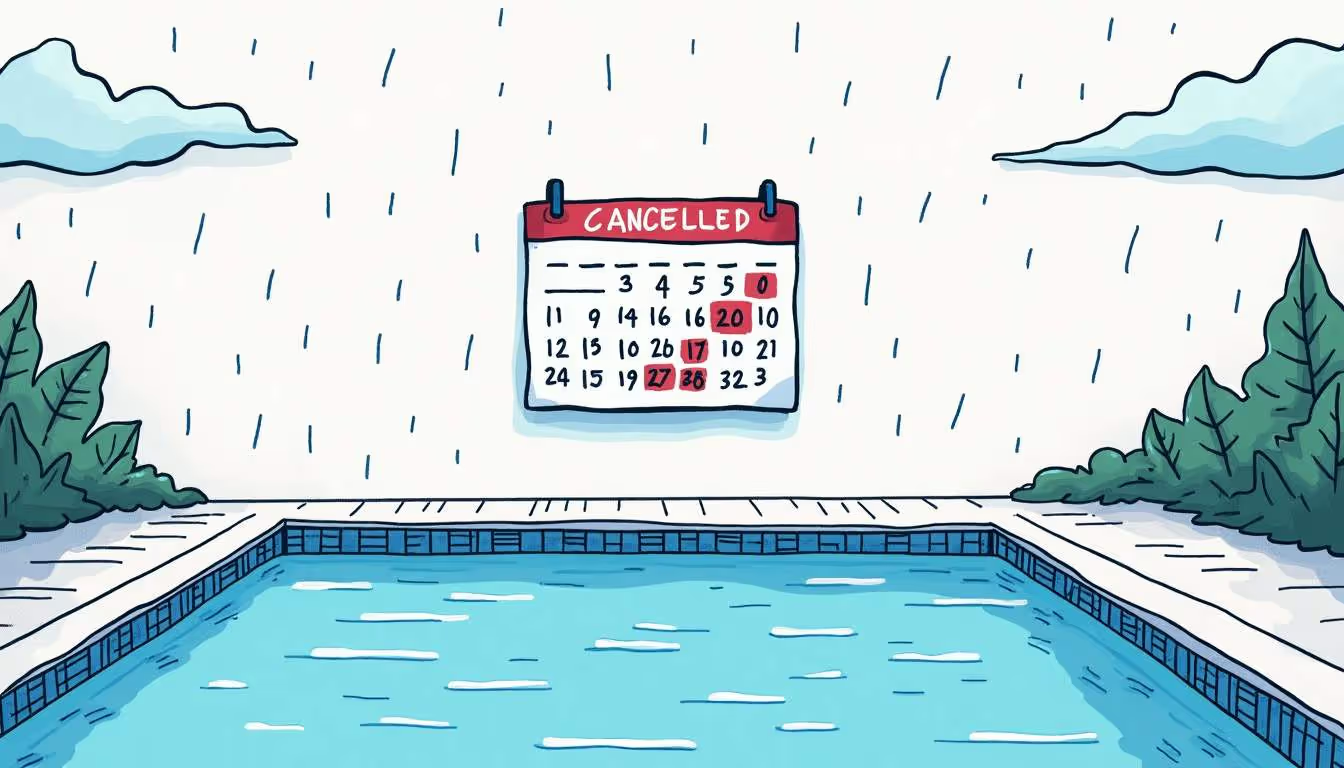Managing Pool Service Operations: Handling Cancellations, Rain Delays, and Rescheduling
Running a successful pool service business involves more than just cleaning and maintenance—it requires adept management of operations, especially when faced with unpredictable challenges like cancellations, rain delays, and rescheduling. These factors can disrupt daily workflows, impact customer satisfaction, and affect profitability if not handled strategically.
In this article, we explore proven strategies and industry-leading practices that empower pool service companies to navigate these common hurdles effectively. From leveraging technology to refining communication and policies, discover how to optimize your operations and keep your customers happy, rain or shine.
Why Managing Cancellations and Rescheduling Matters
Cancellations and rescheduling are inevitable in any service-based business, but their impact can be particularly pronounced in pool service operations. When appointments are missed or shifted without proper management, it can lead to wasted technician time, inefficient routing, and lost revenue.

For example, Jason’s Pool Services saw a 45% reduction in no-shows after adopting an automated scheduling system that sends clients both email and SMS reminders. This case highlights how proactive management of appointments can directly improve operational efficiency. By leveraging technology, businesses can not only streamline their processes but also enhance customer satisfaction, as reminders serve as a gentle nudge for clients who may have forgotten their scheduled service.
Clear cancellation and rescheduling policies also play a critical role. When clients understand the expectations and consequences, they are more likely to respect appointment commitments, reducing last-minute disruptions. Furthermore, these policies can be tailored to accommodate special circumstances, such as emergencies or severe weather conditions, ensuring that clients feel valued while still maintaining the integrity of the scheduling system.
Establishing Transparent Policies
Developing and communicating clear policies about cancellations and rescheduling is essential. This includes specifying the minimum notice period required for changes, any fees associated with late cancellations, and how clients can reschedule appointments easily. By providing multiple channels for communication, such as a dedicated phone line, email, or an online portal, businesses can make the rescheduling process as seamless as possible for clients, thereby reducing frustration on both sides.
Consistency in enforcing these policies builds trust and sets professional standards. It also helps protect your business from revenue loss and allows for better planning of technician schedules. Moreover, taking the time to educate clients about the rationale behind these policies can foster a sense of partnership, encouraging them to adhere to the guidelines. For instance, sharing insights on how last-minute cancellations affect not only the business but also other customers waiting for service can create a more empathetic understanding of the situation. This approach not only minimizes disruptions but also enhances the overall customer experience, leading to long-term loyalty and repeat business.
Leveraging Technology for Scheduling and Route Optimization
Technology has transformed how pool service businesses manage their daily operations. Automated scheduling platforms not only reduce no-shows but also streamline communication and provide clients with the flexibility to adjust appointments themselves. This shift towards digital solutions has enabled businesses to allocate resources more effectively, allowing them to focus on delivering high-quality service rather than getting bogged down by administrative tasks.
Beyond scheduling, route optimization software is a game-changer. By planning the most efficient routes, businesses can minimize travel time, reduce fuel costs, and increase the number of service calls completed each day. This not only enhances operational efficiency but also contributes to a lower carbon footprint, aligning with the growing emphasis on sustainability in business practices.
Benefits of Automated Scheduling Systems
Automated scheduling tools offer several advantages:
- Automated Reminders: Email and SMS notifications remind clients about upcoming appointments, reducing forgetfulness and no-shows.
- Self-Service Rescheduling: Clients can easily modify their appointments without needing to call, improving convenience and reducing administrative workload.
- Real-Time Updates: Technicians and dispatchers receive instant updates on schedule changes, allowing for quick adjustments.
Jason’s Pool Services’ experience with automated scheduling demonstrates how integrating these features can lead to a significant drop in missed appointments, enhancing overall productivity. Furthermore, the data collected through these systems can provide valuable insights into client preferences and service patterns, enabling businesses to tailor their offerings and marketing strategies more effectively.
Optimizing Routes for Maximum Efficiency
Route planning software analyzes service locations and traffic patterns to create the most efficient daily routes. This approach minimizes downtime between appointments and ensures timely service delivery. By leveraging real-time traffic data and historical patterns, these systems can adapt to unexpected delays, ensuring that technicians remain on schedule even when faced with unforeseen circumstances.
Pool service businesses that adopt all-in-one management software report smoother day-to-day operations and improved customer satisfaction thanks to punctual and reliable service. Additionally, the ability to track technician locations and service times in real-time provides management with the insights needed to make informed decisions about staffing and resource allocation, ultimately leading to a more agile and responsive business model. This level of operational transparency not only boosts employee morale but also fosters a culture of accountability and excellence within the team.
Proactive Weather Monitoring and Its Impact on Scheduling
Weather conditions, especially rain and thunderstorms, are a major factor affecting pool service schedules. In regions like Miami, FL, frequent thunderstorms can cause unexpected delays and cancellations. The unpredictable nature of these weather patterns means that service providers must be agile and responsive, ensuring they can adapt quickly to changing conditions. This is particularly important in an area where the demand for pool maintenance peaks during the summer months, making it crucial to keep operations running smoothly despite the weather challenges.

By proactively monitoring weather forecasts, businesses can anticipate disruptions and adjust schedules accordingly. This foresight allows for better communication with clients and reduces last-minute rescheduling chaos. Additionally, utilizing advanced weather tracking tools and apps can provide real-time updates, enabling service providers to stay ahead of the curve. By integrating these technologies, companies can not only streamline their operations but also enhance their overall service quality, ensuring that clients feel valued and informed throughout the process.
Implementing Weather-Responsive Scheduling
Integrate weather data into your scheduling system to flag high-risk days. When storms are predicted, notify clients in advance about potential delays or rescheduling options. This proactive approach can be further enhanced by offering flexible scheduling alternatives, such as weekend service or extended hours on less busy days, which can help accommodate clients who may need urgent service after a storm.
This approach not only demonstrates professionalism but also helps manage customer expectations, reducing frustration and enhancing trust. Moreover, by keeping clients informed and involved in the scheduling process, businesses can foster a sense of partnership that encourages loyalty. Regular updates and transparent communication can transform a potentially negative experience into an opportunity for building stronger relationships. As a result, clients are more likely to appreciate the effort taken to ensure their pools are well-maintained, even amidst unpredictable weather conditions.
Effective Communication: The Cornerstone of Customer Satisfaction
Open and timely communication with clients is vital, especially when dealing with cancellations, rain delays, or rescheduling. Customers appreciate transparency and updates that keep them informed about their service appointments.
Utilizing multiple communication channels—such as phone calls, emails, SMS, and even mobile app notifications—ensures messages reach clients promptly and conveniently.
Best Practices for Client Communication
- Advance Notifications: Inform clients as early as possible about any changes to their service schedule.
- Clear Explanations: Provide reasons for delays or cancellations, such as weather conditions or unforeseen circumstances.
- Alternative Options: Offer convenient rescheduling slots or make-up service appointments to maintain customer satisfaction.
Consistent communication not only reduces confusion but also fosters loyalty and positive word-of-mouth referrals.
Investing in Employee Training to Handle Scheduling Challenges
Technicians and customer service staff are on the front lines of managing cancellations, rescheduling, and weather-related delays. Equipping them with the right skills is crucial for smooth operations.
Training should focus on effective communication techniques, time management, and problem-solving skills. Employees should feel empowered to handle client inquiries professionally and offer flexible solutions.
Building a Responsive and Skilled Team
Regular training sessions can cover:
- How to explain cancellation policies clearly and empathetically
- Techniques for managing client expectations during weather disruptions
- Using scheduling and route planning software efficiently
A well-trained team reduces operational friction and enhances the overall customer experience, contributing to business growth.
Adapting to Industry Trends for Long-Term Success
The pool service industry is evolving rapidly, with increasing adoption of technology and a stronger focus on customer-centric approaches. Staying informed about these trends allows businesses to refine their scheduling and operational strategies.
The 2025 State of Pool Service report highlights a significant shift towards integrated management platforms that combine scheduling, route planning, customer communication, and analytics. Embracing these tools can provide a competitive edge.
Continuous Improvement Through Data and Feedback
Regularly analyze scheduling data to identify patterns such as peak cancellation times or frequent rain delays. Use these insights to adjust policies and optimize resource allocation.
Additionally, solicit client feedback on scheduling experiences to uncover areas for improvement and tailor services to meet evolving expectations.
Conclusion
Effectively managing cancellations, rain delays, and rescheduling is essential for running a profitable and customer-focused pool service business. By implementing automated scheduling systems, establishing clear policies, leveraging route optimization technology, proactively monitoring weather, maintaining open communication, investing in employee training, and staying attuned to industry trends, pool service companies can navigate operational challenges with confidence.

These strategies not only enhance efficiency and reduce disruptions but also build stronger relationships with clients, fostering loyalty and long-term success in a competitive market.








